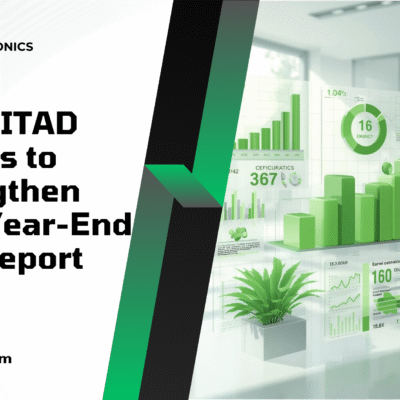Introduction
Many businesses view IT Asset Disposition (ITAD) as an operational necessity rather than a financial opportunity. However, a well-managed ITAD strategy can do more than just dispose of outdated technology. It can recover value, reduce expenses, and enhance overall financial performance. By integrating secure, compliant, and cost-effective ITAD solutions, companies can maximize returns on retired IT assets, reduce liability risks, and strengthen their sustainability efforts. This guide explores how ITAD services can directly benefit your company’s bottom line while ensuring data security and environmental responsibility.
📌 Related: A Detailed Guide to IT Asset Disposal
Recovering Value from Retired IT Assets
Businesses often overlook the value in outdated IT equipment. Instead of discarding old computers, servers, and networking devices, companies can resell, refurbish, or repurpose these assets to generate revenue. Functional devices can be resold in secondary markets, and older hardware can be refurbished and redeployed for internal use. In some cases, even non-working IT assets hold value, as individual components such as processors, memory, and storage devices can be harvested and reused.
IT Asset Buyback Programs provide businesses with financial returns when retiring large quantities of IT equipment. By working with a certified ITAD provider, businesses can assess the resale potential of their retired assets, ensuring that they maximize their return on investment while disposing of IT equipment securely and ethically.
Reducing IT Disposal and Storage Costs
Many companies store outdated IT assets for months or even years due to uncertainty about proper disposal. This takes up valuable office space and increases security risks, while also adding unnecessary maintenance costs. A structured IT asset disposition strategy helps businesses eliminate storage expenses by securely processing retired IT assets in a timely manner.
Outsourcing IT asset disposal to a certified ITAD provider reduces the burden on internal IT teams, freeing them from managing obsolete equipment. With a clear ITAD process in place, businesses can also minimize the risk of regulatory fines by ensuring compliance with proper disposal laws. Additionally, repurposing functional IT assets can prevent unnecessary capital expenditures on new equipment, further contributing to cost savings.
📌 Related: The Future of ITAD Services: Trends You Need to Know
Avoiding Regulatory Fines and Legal Liabilities
Improper disposal of IT assets can lead to financial penalties due to data breaches and non-compliance with environmental regulations. Organizations handling sensitive data, such as those in the healthcare, finance, and government sectors, must comply with strict data protection laws to avoid severe consequences.
Regulations such as the General Data Protection Regulation (GDPR) enforce strict data destruction policies for companies handling EU customer data. Healthcare providers must comply with the Health Insurance Portability and Accountability Act (HIPAA), which mandates secure disposal of electronic protected health information (ePHI). Businesses that fail to follow these guidelines may face penalties reaching millions of dollars per violation.
Environmental fines are another risk, as illegally dumping or exporting e-waste can lead to enforcement actions by regulatory agencies like the Environmental Protection Agency (EPA). By partnering with R2-certified ITAD vendors, businesses can mitigate these risks and ensure compliance with data security and environmental laws, avoiding costly fines and legal repercussions.
📌 Related: Understanding HIPAA Compliance in ITAD Services
Enhancing Operational Efficiency and IT Asset Management
ITAD services streamline the IT lifecycle, allowing companies to upgrade technology seamlessly while minimizing downtime. Businesses that regularly audit and refresh their IT assets experience improved productivity and cost savings. A well-managed ITAD process simplifies IT asset tracking, provides secure data destruction, and ensures a seamless transition to new technology without accumulating unnecessary hardware.
By working with a certified ITAD provider, businesses can offload the responsibilities of IT asset tracking and disposal, reducing the workload on internal IT teams. This not only enhances efficiency but also minimizes security risks associated with outdated IT equipment. With proper ITAD procedures in place, businesses can focus on their core operations without the added burden of managing retired IT assets.
📌 Related: How to Choose an ITAD Vendor You Can Trust
Supporting Corporate Sustainability Goals
As companies prioritize Environmental, Social, and Governance (ESG) initiatives, ITAD services play a vital role in helping businesses achieve sustainability goals. Proper IT asset disposition reduces e-waste by ensuring that IT equipment is reused, refurbished, or recycled responsibly.
Sustainable ITAD practices contribute to the circular economy by extending the lifespan of electronic devices, eliminating hazardous waste disposal risks, and minimizing the environmental impact of discarded technology. Businesses that align their ITAD strategy with corporate sustainability goals enhance their brand reputation, attract eco-conscious investors, and demonstrate a commitment to responsible business practices.
📌 Related: How ITAD Can Help You Meet Your ESG Goals
Strengthening Data Security and Preventing Costly Breaches
One of the biggest financial risks businesses face in IT asset disposal is the potential for data breaches. Even after files are deleted, sensitive business data can still be recovered from improperly discarded devices. Cybercriminals can retrieve confidential information and use it for fraud, identity theft, and corporate espionage.
To mitigate these risks, businesses must use industry-approved data destruction methods such as NIST 800-88 or DoD 5220.22-M standards. Certified ITAD providers ensure that data is securely erased or physically destroyed before IT assets are processed for resale or recycling. Companies should also obtain Certificates of Data Destruction to verify compliance and protect themselves from liability.
By integrating secure ITAD processes, businesses reduce the risk of costly legal claims, loss of customer trust, and reputational damage caused by data breaches.
📌 Related: Data Privacy Risks in IT Asset Disposal and How to Mitigate Them
Conclusion: ITAD is a Smart Financial Strategy
Rather than being just an operational necessity, ITAD services can directly improve a company’s financial health. Businesses that leverage ITAD strategically can generate revenue through IT asset resale, reduce storage and disposal costs, prevent regulatory fines, and enhance operational efficiency. Additionally, ITAD supports corporate sustainability efforts and strengthens data security, protecting businesses from financial and reputational risks.
By working with a certified ITAD provider, companies can turn their IT disposal process into a cost-saving and revenue-generating opportunity. At IER ITAD Electronics Recycling, we help businesses maximize the financial benefits of ITAD while ensuring security and compliance. Contact us today to learn how our ITAD services can improve your bottom line.





